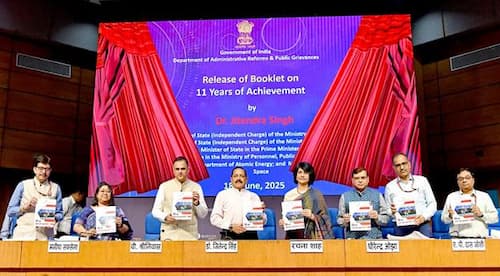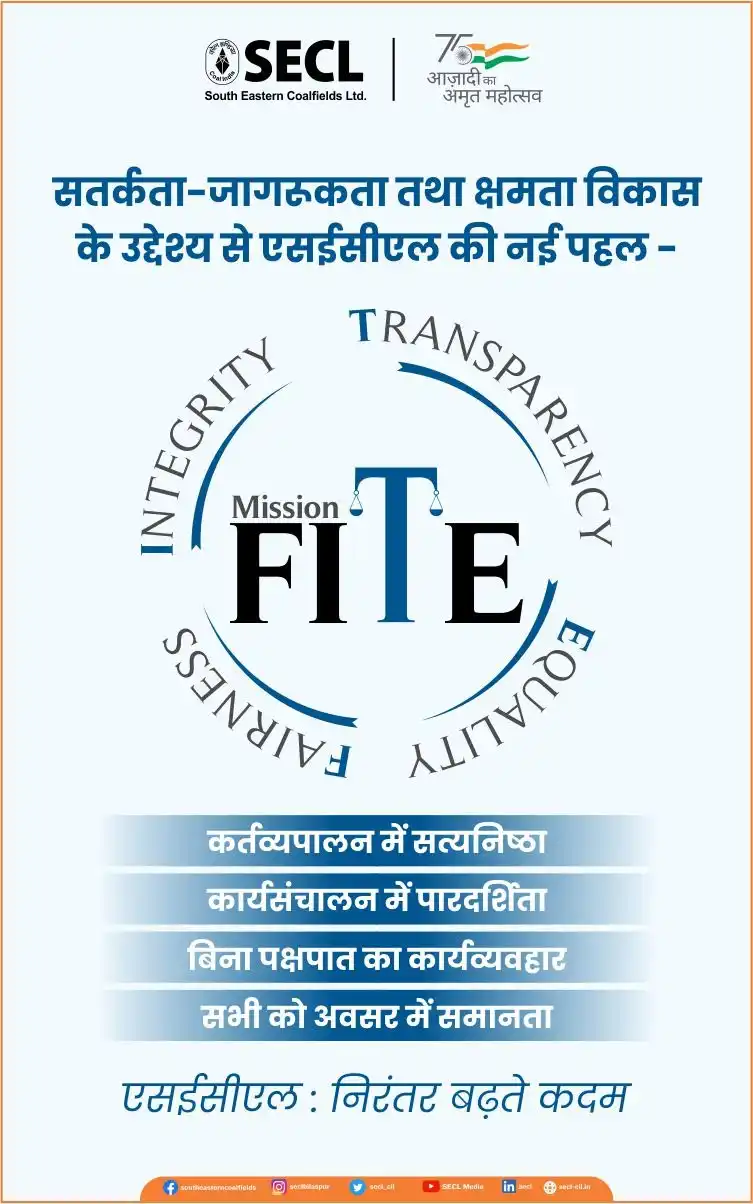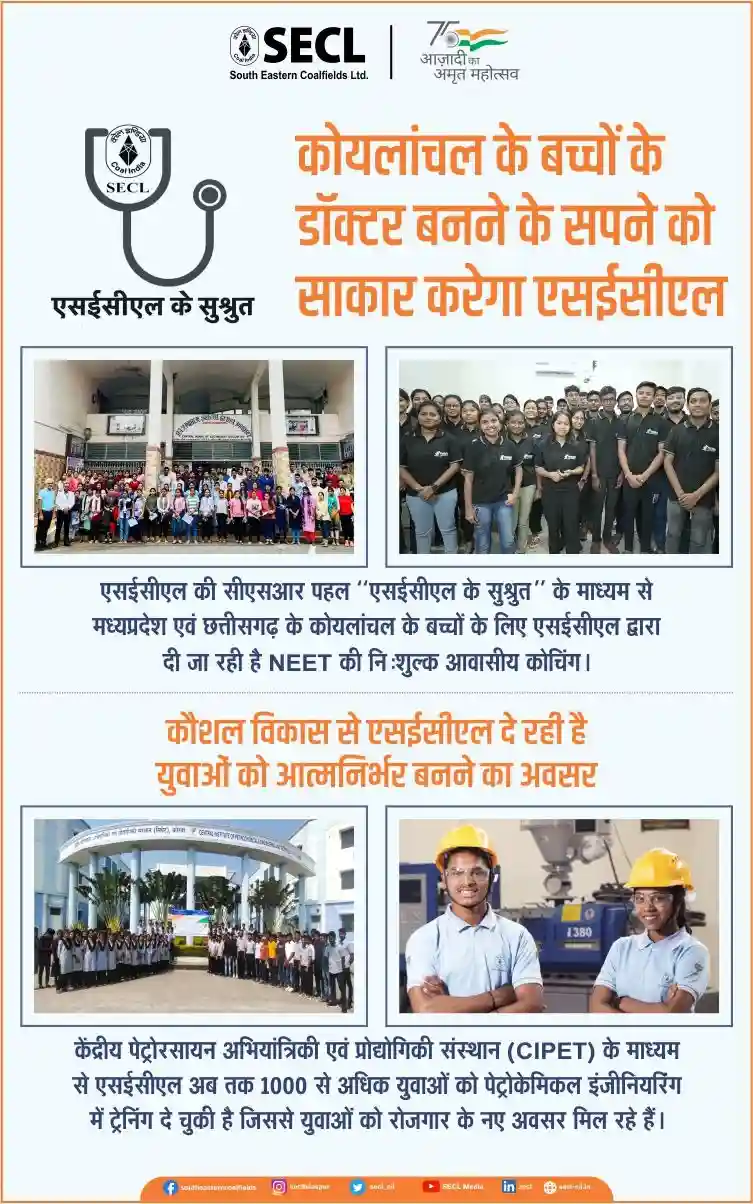Union Minister of State (Independent Charge) for Science and Technology; Earth Sciences and Minister of State for PMO, Department of Atomic Energy, Department of Space, Personnel, Public Grievances and Pensions, Dr. Jitendra Singh on Today outlined the transformational journey of the Ministry of Personnel, Public Grievances and Pensions over the past 11 years, highlighting a series of reforms aimed at simplifying governance, empowering citizens, and humanizing administration.
On the occasion, the Minister also made the important announcement that Central government employees covered under the Unified Pension Scheme will now be eligible for retirement and death gratuity benefits, as per the provisions of the Central Civil Service (Payment of Gratuity under National Pension System) Rules, 2021.
Responding to this long-pending demand by a large section of government employees, Union Minister Dr. Jitendra Singh said, the move addresses a significant demand of government staff and brings parity in retirement benefits. He said, the new provision reflects the government’s commitment to ensure social security for all categories of employees under the National Pension System.
Speaking at a commemorative event at National Media Centre here, the Minister categorized the Ministry’s work into four major areas that reflected the changing face of governance under the Modi Government.
“For the first time since Independence, a government has taken pride in doing away with redundant rules rather than creating new ones,” Dr. Jitendra Singh said, citing the repeal of over 1,600 outdated provisions—many of them colonial-era legacies—as a strong message of trust in citizens, particularly India’s youth. The decision to make job interviews non-evaluative for certain categories, announced from the Red Fort by the Prime Minister and implemented nationwide by January 2016, was flagged as a key move towards fairness and transparency in recruitment.
Dr. Jitendra Singh underscored that several of the Ministry’s reforms went beyond administrative convenience and carried broader socio-cultural messages. Measures such as the amendments to the Prevention of Corruption Act sought to balance accountability with protection for well-performing officials, while changes in how cases of unfair means in examinations are handled have been aimed at protecting students from the fallout of organized cheating rackets. “We are here to punish the racketeers, not the students,” the Minister said, emphasizing the government’s intent to move from suspicion to support in public policy. These changes, he said, helped build a new narrative for governance where intent is not presumed guilty and trust becomes a foundational value.
Human-centric reforms formed the third pillar of the Ministry’s efforts, with Dr. Jitendra Singh recounting how several changes were driven by direct experiences of insensitivity in existing rules. The introduction of the digital life certificate for pensioners, reforms in family pension norms to include divorced and separated daughters, and extending maternity leave to stillbirth cases were some of the examples he shared. “We combined human concern with technology to create solutions that respect the dignity of individuals,” he said, recalling how over 19,000 long-pending promotions were expedited to bring relief to officials who had served without timely career progression. These measures, he said, reflected an approach that viewed policy through the lens of empathy.
Highlighting innovation as the fourth key area, the Minister said that several governance reforms have been infused with out-of-the-box thinking and technological adaptability. The establishment of the Capacity Building Commission and rollout of the iGOT-Karmayogi platform were mentioned as game-changers in preparing civil servants for real-world challenges. The CPGRAMS grievance redressal portal, which now handles over 26 lakh complaints annually with a 95-96% disposal rate, was cited as a case of how citizen expectations have evolved in response to responsive governance. Initiatives like ‘Anubhav’, where retiring officers document their experiences for institutional memory, and the Assistant Secretary programme for IAS officers, were held up as efforts to build a knowledge-oriented, future-ready bureaucracy. “We have moved from red tape to real-time, from file-pushing to feedback-based policy,” Dr. Jitendra Singh concluded, noting that these reforms mark a significant shift in the governance ethos of New India.
During the press conference, Union Minister Dr. Jitendra Singh also released a set of key publications and digital initiatives that reflect the Ministry’s continued focus on transparency, accountability, and service delivery. These included the 11-year achievement booklets of DoPT, DARPG, and DoPPW, offering a comprehensive overview of reforms and milestones across the three departments.
The Minister also unveiled the Guidelines for the Special Campaign for Family Pensioners’ Grievances, a Compendium of Circulars covering the period from August 2024 to June 2025, and a set of circulars related to the Central Civil Services (Union Public Service) rules. In a move to strengthen capacity building within the system, Dr. Jitendra Singh virtually launched the Sevottam Training Modules, aimed at institutionalising excellence in public service delivery.
Adding to the overview, Secretary, Department of Personnel and Training (DoPT), Ms. Rachna Shah highlighted a series of structural reforms and inclusive governance initiatives undertaken over the last 11 years. Framed around the Prime Minister’s mantra of “Minimum Government, Maximum Governance,” she outlined measures such as the discontinuation of interviews for certain posts, faster recruitment timelines, digitalisation through platforms like e-HRMS and e-APAR, and the conduct of exams in multiple Indian languages. The National Recruitment Agency and Rojgar Melas were cited as transformative steps towards enhancing employment opportunities for youth, while 4.5 lakh backlog vacancies in reserved categories were addressed.
Over 19,000 promotions in the Central Secretariat Service were fast-tracked to improve morale, and comprehensive guidelines were issued on matters such as maternity leave, child care, and disability reservation. Capacity building efforts under Mission Karmayogi have now onboarded over one crore government employees, fostering a culture of lifelong learning. Ms. Shah also stressed that DoPT’s focus on transparency and accountability was reinforced by digital RTI platforms and a modernised Central Administrative Tribunal that disposed of over 8.9 lakh cases, with enhanced use of virtual hearings and e-governance tools.
Secretary, Department of Administrative Reforms and Public Grievances (DARPG) and Department of Pension and Pensioners’ Welfare (DoPPW), Shri. V. Srinivas, outlined the far-reaching governance reforms and digital citizen services rolled out over the last 11 years, anchored in the Prime Minister’s vision of “Citizen First, Nation First.” He highlighted how CPGRAMS has evolved into one of the world’s largest AI-enabled multilingual grievance redressal platforms, handling over 26 lakh public grievances annually with response times cut to under 14 days. Public feedback from over 20 lakh citizens is now used to improve service delivery. Under his leadership, initiatives like Sushasan Saptah, Swachhata campaigns, National e-Governance Awards, and replication of e-office models across Northeastern states and Jammu & Kashmir have yielded visible impact. On the pensions front, over 4 crore pensioners have been digitally empowered through Digital Life Certificates and pre-retirement counselling. The popular Pension Adalats have resolved more than 25,000 cases directly, and efforts like integrated pension forms and simplification of CCS Rules reflect a commitment to ease of living for retirees. Mr. Srinivas also pointed to India’s growing international collaboration on good governance, including MOUs signed during high-level bilateral engagements and a globally recognised presence at public administration forums.
Also present on the dais were senior officers from the three departments under the Ministry, including Ms. Manisha Saxena, Establishment Officer, DoPT; Shri. A.P. Das Joshi, Additional Secretary, DoPT; Shri. Manoj Kumar Dwivedi, Additional Secretary, DoPT and Puneet Yadav, Additional Secretary, DARPG. The event saw the participation of all senior officers from the Department of Personnel and Training, the Department of Pension and Pensioners’ Welfare, and the Department of Administrative Reforms and Public Grievances, reflecting a unified administrative presence in marking the Ministry’s eleven-year journey of reforms and innovations.
















